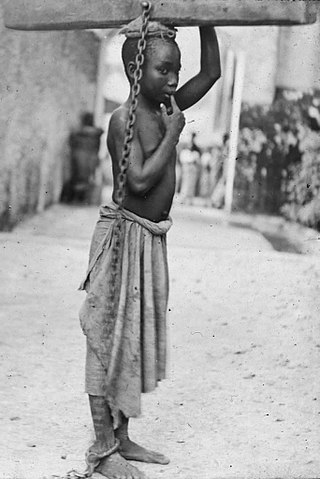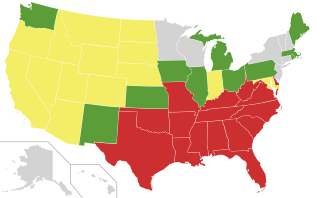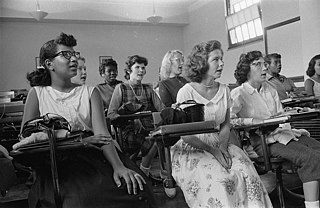
Robert J. Cottrol (born January 18, 1949) is an American legal scholar and legal historian.

Robert J. Cottrol (born January 18, 1949) is an American legal scholar and legal historian.
Cottrol holds a chair in the George Washington University (GWU) Law School and is also a professor of history and sociology at GWU. [1] [2] He earned his B.A. and Ph.D. from Yale University, and his J.D. from Georgetown Law School. [1] His research concentrates on race relations in U.S. legal history and criminal law contexts. [1] He is the author of five books and dozens of book chapters, law review articles, book reviews, and other published works on slavery, gun control, and others topics. [3] He is also the editor of Gun Control and the Constitution: Sources and Explorations on the Second Amendment. [1]
Cottrol supports the use of background checks on firearms purchases, especially to prevent ownership by convicted felons. However, he argues that law-abiding citizens should have ready access to guns for self-defense. He says that minorities in particular need them to counter the threat of harsh treatment in racist cultures. [1]

The Emancipation Proclamation, officially Proclamation 95, was a presidential proclamation and executive order issued by United States President Abraham Lincoln on January 1, 1863, during the American Civil War. The Proclamation changed the legal status of more than 3.5 million enslaved African Americans in the secessionist Confederate states from enslaved to free. As soon as slaves escaped the control of their enslavers, either by fleeing to Union lines or through the advance of federal troops, they were permanently free. In addition, the Proclamation allowed for former slaves to "be received into the armed service of the United States".

The Second Amendment to the United States Constitution protects the right to keep and bear arms. It was ratified on December 15, 1791, along with nine other articles of the Bill of Rights. In District of Columbia v. Heller (2008), the Supreme Court affirmed for the first time that the right belongs to individuals, for self-defense in the home, while also including, as dicta, that the right is not unlimited and does not preclude the existence of certain long-standing prohibitions such as those forbidding "the possession of firearms by felons and the mentally ill" or restrictions on "the carrying of dangerous and unusual weapons". In McDonald v. City of Chicago (2010) the Supreme Court ruled that state and local governments are limited to the same extent as the federal government from infringing upon this right. New York State Rifle & Pistol Association, Inc. v. Bruen (2022) assured the right to carry weapons in public spaces with reasonable exceptions.

The Thirteenth Amendment to the United States Constitution abolished slavery and involuntary servitude, except as punishment for a crime. The amendment was passed by the Senate on April 8, 1864, by the House of Representatives on January 31, 1865, and ratified by the required 27 of the then 36 states on December 6, 1865, and proclaimed on December 18. It was the first of the three Reconstruction Amendments adopted following the American Civil War.

Abolitionism, or the abolitionist movement, is the movement to end slavery. In Western Europe and the Americas, abolitionism was a historic movement that sought to end the Atlantic slave trade and liberate the enslaved people, which eventually spread to eradicate slavery from the entire world.

The legal institution of human chattel slavery, comprising the enslavement primarily of Africans and African Americans, was prevalent in the United States of America from its founding in 1776 until 1865, predominantly in the South. Slavery was established throughout European colonization in the Americas. From 1526, during early colonial days, it was practiced in what became Britain's colonies, including the Thirteen Colonies that formed the United States. Under the law, an enslaved person was treated as property that could be bought, sold, or given away. Slavery lasted in about half of U.S. states until abolition. In the decades after the end of Reconstruction, many of slavery's economic and social functions were continued through segregation, sharecropping, and convict leasing.
In American political discourse, states' rights are political powers held for the state governments rather than the federal government according to the United States Constitution, reflecting especially the enumerated powers of Congress and the Tenth Amendment. The enumerated powers that are listed in the Constitution include exclusive federal powers, as well as concurrent powers that are shared with the states, and all of those powers are contrasted with the reserved powers—also called states' rights—that only the states possess.

Gun politics is defined in the United States by two primary opposing ideologies about civilian gun ownership. Those who advocate for gun control support increased regulation of gun ownership; those who advocate for gun rights oppose increased restriction of gun ownership. These groups often disagree on the interpretation of laws and court cases related to firearms and of the effectiveness of firearms regulation on crime and public safety. There is also a well-known gender gap when it comes to gun control, and many argue that a possible explanation for this is authoritarianism. It was estimated, in 2018, that U.S. civilians own 393 million firearms, and that 40% to 42% of the households in the country have at least one gun. However, record gun sales followed in the following years. The U.S. has by far the highest estimated number of guns per capita in the world, at 120.5 guns for every 100 people.
Robert James Spitzer is an American political scientist, commentator, and author. Spitzer is the author of numerous books, articles, essays, papers, and op-eds on many topics related to American politics. His areas of specialty include the American presidency and gun politics.
Neoabolitionist is a term used in historiography to characterize historians of race relations motivated by the spirit of racial equality typified by the abolitionists who fought to abolish slavery in the mid-19th century. They write especially about African-American history, slavery in the United States, the American Civil War and the Reconstruction Era.
Paul Finkelman is an American legal historian, the Robert E. and Susan T. Rydell Visiting Professor at Gustavus Adolphus College in St. Peter, Minnesota, and a research affiliate at the Max and Tessie Zelikovitz Centre for Jewish Studies, Carleton University, Ottawa, Canada. He is the author or editor of more than 50 books on American legal and constitutional history, slavery, general American history and baseball. In addition, he has authored more than 200 scholarly articles on these and many other subjects. From 2017 - 2022, Finkelman served as the President and Chancellor of Gratz College, Melrose Park, Pennsylvania.

David Brion Davis was an American intellectual and cultural historian, and a leading authority on slavery and abolition in the Western world. He was a Sterling Professor of History at Yale University, and founder and director of Yale's Gilder Lehrman Center for the Study of Slavery, Resistance, and Abolition.
The civil rights movement (1865–1896) aimed to eliminate racial discrimination against African Americans, improve their educational and employment opportunities, and establish their electoral power, just after the abolition of slavery in the United States. The period from 1865 to 1895 saw a tremendous change in the fortunes of the black community following the elimination of slavery in the South.

An Act for the Gradual Abolition of Slavery, passed by the Fifth Pennsylvania General Assembly on 1 March 1780, prescribed an end for slavery in Pennsylvania. It was the first act abolishing slavery in the course of human history to be adopted by a democracy. The Act prohibited further importation of slaves into the state, required Pennsylvania slaveholders to annually register their slaves, and established that all children born in Pennsylvania were free persons regardless of the condition or race of their parents. Those enslaved in Pennsylvania before the 1780 law came into effect remained enslaved for life. Pennsylvania's "gradual abolition"—rather than Massachusetts's 1783 "instant abolition"—became a model for freeing slaves in other Northern states.

Slavery in Virginia began with the capture and enslavement of Native Americans during the early days of the English Colony of Virginia and through the late eighteenth century. They primarily worked in tobacco fields. Africans were first brought to colonial Virginia in 1619, when 20 Africans from present-day Angola arrived in Virginia aboard the ship The White Lion.

Freedom suits were lawsuits in the Thirteen Colonies and the United States filed by slaves against slaveholders to assert claims to freedom, often based on descent from a free maternal ancestor, or time held as a resident in a free state or territory.

In the United States, anti-miscegenation laws were passed by most states to prohibit interracial marriage, and in some cases also prohibit interracial sexual relations. Some such laws predate the establishment of the United States, some dating to the later 17th or early 18th century, a century or more after the complete racialization of slavery. Nine states never enacted such laws; 25 states had repealed their laws by 1967, when the United States Supreme Court ruled in Loving v. Virginia that such laws were unconstitutional in the remaining 16 states. The term miscegenation was first used in 1863, during the American Civil War, by journalists to discredit the abolitionist movement by stirring up debate over the prospect of interracial marriage after the abolition of slavery.

In the United States, school integration is the process of ending race-based segregation within American public and private schools. Racial segregation in schools existed throughout most of American history and remains an issue in contemporary education. During the Civil Rights Movement school integration became a priority, but since then de facto segregation has again become prevalent.

Joyce Lee Malcolm is the Patrick Henry Professor of Constitutional Law and the Second Amendment at George Mason University School of Law. She has been called "the leading historian on the history of English gun control and gun rights" by David Kopel.
Gerard Magliocca is an American law professor, the Samuel R. Rosen Professor at the Indiana University Robert H. McKinney School of Law. He is a noted scholar and expert on constitutional issues, particularly its historical underpinnings.
Martha S. Jones is an American historian and legal scholar. She is the Society of Black Alumni Presidential Professor and Professor of History at The Johns Hopkins University. She studies the legal and cultural history of the United States, with a particular focus on how Black Americans have shaped the history of American democracy. She has published books on the voting rights of African American women, the debates about women's rights among Black Americans in the early United States, and the development of birthright citizenship in the United States as promoted by African Americans in Baltimore before the Civil War.